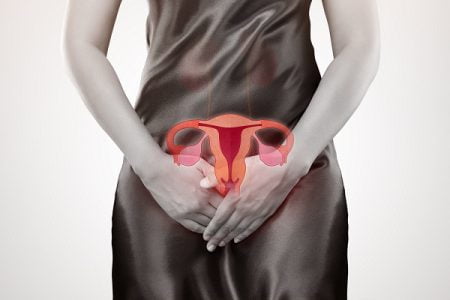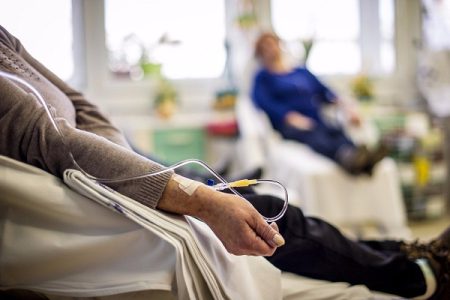Is Cervical Cancer Hereditary?
- Updated on: Nov 10, 2020
- 4 min Read
- Published on Nov 10, 2020

Is Cervical Cancer Hereditary?
Cancer is such a prevalent disease in today’s era that somewhere every family has been touched by a minimum of one cancer case. It is believed that people who have cancer carry high-risk genes and also have strong chances of it to reoccur even after treatment. A study confirmed that around 7 to 10% of nearly all cancer cases occur in people who inherited mutations, which increase the risk of cancer. Some researchers have found that gene mutations and alterations affect people at high risk of inheriting various types of cancer, such as breast, ovarian, and colon cancer.
The question that “is cervical cancer genetic” is often answered with a phenomenon known as “germline mutation.” Identification of autosomal dominant hereditary breast-ovarian cancer (HBOC) syndrome and discovery of the BRCA1 and BRCA2 gene mutations lead to the evidence and study of cancer and its genetics. Several other germline mutations, namely hMSH2, hMLH1, hPMS2, hMSH3, and hMSH6, have been identified that proved an integral association of endometrial and ovarian carcinomas in those families who had an autosomal dominant diversion towards colorectal cancers that define the Lynch syndrome II- a variant of hereditary nonpolyposis colorectal cancer (HNPCC) syndrome. Specific gene mutations associated with HBOC and HNPCC syndromes are identified and tested through DNA testing due to the direct inheritance line.
Can Cancer Run in the Family?
Cancer is generally a result of faulty genes. Sometimes, a few defective genes elevate the chances of cancer to be transferred from parent to child, and they are referred to as “inherited cancer genes.” Faulty genes occur if there is a mismatch or mutation, or fault in an egg or sperm cell’s genes. When these genes are passed on to children, they increase cancer risk and are referred to as cancer susceptibility genes. If these genes are inherited, then the damaged DNA in cells cannot be repaired, leading to the formation of tumors that finally might become cancerous.
Children have genes from both parents, and therefore, there are 50% chances that a child might carry faulty genes even if one parent is affected. This increases the risk of cancer development in some children. But, the chance of the presence of faulty genes in a person is significantly less.
Cervical Cancer and Genetics
An estimate suggests that cervical cancer’s death rate is higher worldwide than any cancer in women (except for breast cancer). Researchers have found that women whose genital tract becomes severely infected with certain types of HPV (a virus called high-risk “human papillomavirus”) generally develop cervical cancer. HPV is a very common virus transmitted by skin to skin contact in the genital area and result in the formation of genital warts. This infection can be detected through the HPV test for women. HPV produces proteins E6, and E7, which inactivate the cellular tumor suppressor proteins. E6 inactivates the protein p53. The p53 protein puts an emergency stop to those dividing cells that are genetically damaged or mutated.
The leading cause of cervical cancer is HPV. HPV infection is not genetic, but there are chances of cervical cancer to run in some families. It is often observed that if your mother or sister has had cervical cancer, there are about 3 to 5% higher chances of developing cervical cancer in you.
Due to inheritance, the immune system does not stay strong enough to fight the HPV infection, and therefore, the chances of attaining cervical cancer increase. The high-risk (HR) types of human papillomavirus (HPV) also increase the risk of cervical cancer in patients with faulty genes.
Although HPV is one of the main reasons for the development of cervical cancer, it does not directly cause any mutations in a person’s genes. HPV infection is not sufficient for cervical cancer development because, in most individuals (about 80%), the virus goes away in 12 to 24 months after initial diagnosis without any intervention. Familial aggregation in cervical cancer states that the chances of acquiring or inheriting the cancer is highest in case of full or close-relatives, moderate for half-siblings, and found to be the lowest for non-biological relatives. Therefore, it is essential to diagnose the host genetic factors in patients with an increased risk of developing cervical cancer.
There are often other non-genetic risk factors when a woman from the affected family as a patient is likely to be diagnosed with cervical cancer, such as excessive smoking, multiple sexual partners, etc.
Read:
Human Papillomavirus (HPV) Vaccination for Prevention of Cervical Cancer in Women.
Is Cervical Cancer Inherited?
After studying the condition that cervical cancer is rarely genetic, it is seen that the leading cause of cervical cancer is HPV and not any historical evidence. In general, cervical cancers happen due to the DNA of HPV, which affects or mutates the DNA of an individual. Cervical cancer can only be inherited when mutation or passing of HPV, while pregnancy increases the child’s risk. But, this situation is very rare to occur as, in most cases, babies also get rid of the HPV virus themselves (immune response).
Sometimes, cervical cancer can be carried over as a part of a syndrome that might turn cancerous in the long run. Peutz-Jeghers syndrome is an example of this when colored spots appears on the skin, on lips, around or inside the mouth, on hands, and feet. Some benign growths may begin along the stomach, breasts, intestines, ovary, and colon, which might later become malignant or cancerous. When these lesions start developing on a woman’s cervix, there are chances that cancer might develop. Peutz-Jeghers syndrome occurs very rarely and can be passed from affected parents to their children and can be inherited.
But, cervical cancer is not hereditary, as about 95% of its cases are due to persistent infections by the HPV virus. About four out of five sexually active women (about 75 to 80%) can be infected with some type of HPV throughout their lives. But, it is not mandatory that all these women will acquire cervical cancer.
To prevent these infections, HPV vaccines are given to the patients, and HPV tests are conducted to diagnose and screen cervical cancer. Women who have had a genetic history of cervical cancer should not avoid genetic testing as a precaution.












